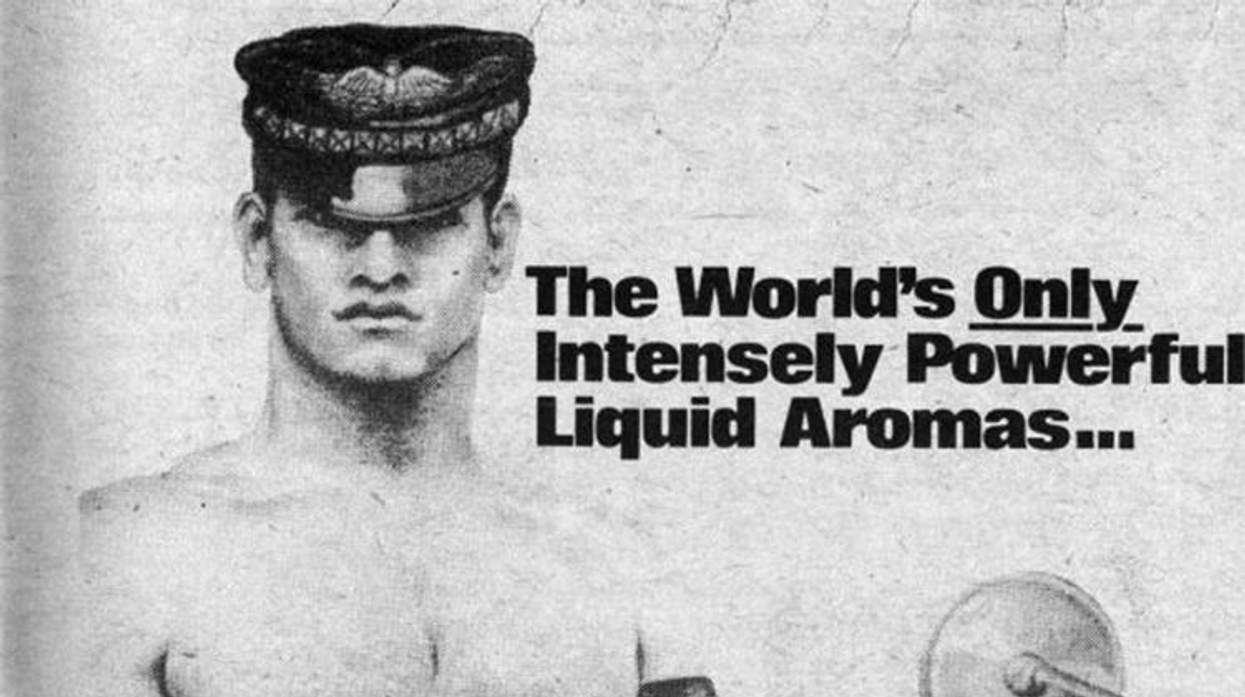There are certain subjects gay and bi men don't typically discuss in mixed company (meaning anyone other than guys who have sex with guys) -- things like bathhouse adventures and pre-sex hygiene come to mind. Poppers are usually part of that list, but not for British Parliament member Crispin Blunt.
"I use poppers," Blunt (yes, Emily's uncle) announced last month in Parliament, while arguing against a bill that bans drugs inducing "legal highs." "I out myself as a poppers user. And would be directly affected by this legislation. And I was astonished to find that it's proposed they be banned and, frankly, so were very many gay men."
Blunt's exit from the poppers closet didn't change enough minds; the Psychoactive Substances Bill passed, allowing police to confiscate any huffable liquid alkyl nitrates sold throughout the U.K. After an outcry, Britain's drug bureaucracy agreed to conduct a six-month review to see if poppers are actually harmful; if they are not, they will be removed from the legislation, which takes effect in April.
British LGBT organization Stonewall criticized the length of the health effects study and demanded an end to the prohibition until the review is finished. "It is clear to us that allowing a full ban to go ahead in April will cause confusion, and more importantly could put gay and bi men's health at serious risk," read a statement by the group. "People who use poppers will be forced to turn to illegal suppliers who could supply poppers containing unknown harmful substances or indeed more harmful illegal drugs."
Would American gays have a similar reaction to a war on poppers? Even though they remain easy to obtain in the U.S., especially in gay novelty stores, and are officially sold as room odorizers or nail polish remover, poppers aren't exactly a cultural phenomenon among queer millennials, or even Gen Xers. Known for producing short head rushes (and often headaches), intense flashes of libido, a loosening of muscles, especially the sphincter, and that horrific smell, poppers are loosening their once-steely grip on places like Palm Springs and P-Town.
New York nightlife promoter Daniel Nardicio says he sees poppers at leather events but rarely at his Fire Island underwear parties, which attract a younger crowd. "[Poppers] are kind of Cleveland," Nardicio says. "Every couple of years someone says, 'Cleveland is coming back!' No, it's not."
For people like Blunt and other gay men north of, say, 40, a nostalgia for poppers remains. The tiny little bottles -- with names like Rush and Quicksilver -- conjure ecstatic nights at the club or marathon sex with beautiful strangers. Some would even go so far as to say they're part of gay culture, like a reverence for wit and strong women.
Poppers were born in the 19th century as a treatment for chest pain, but their popularity waned with the advent of nitroglycerin pills in the mid-20th century. Their manufacturers found a new market for them in the 1970s -- gay party animals.
Alkyl nitrate remained popular through the '80s -- making a memorable appearance in William Friedkin's gay-leather-killer flick Cruising -- and for a time, many were concerned it contributed to or exacerbated HIV transmission. That suspicion was unfounded, and poppers carried over into the 1990s rave scene that queer culture helped make possible.
In the 2010s, while ecstasy found new life as "Molly," poppers didn't catch on with anyone besides their core audience; a survey found that gay men use poppers at a rate 25 times higher than straight guys.
New York-based doctor Frank Spinelli says the drug is still used by some of his gay male patients, though many don't see its potential dangers. "The problem with poppers is that they're readily available and inexpensive," he says (and he's right -- they can be purchased online for under 20 bucks). "Overdosing can lead to unconsciousness, coma, and death."
Because poppers are so closely associated with sex, many pair them with little blue pills. "Poppers are often taken with erectile dysfunction medications like Viagra, Cialis, and Levitra," Spinelli says, "and the combination can lead to the same side effects as an overdose."
The risks, though, are part of poppers' escapist appeal. Countless studies have shown that gay and bisexual men -- due to discrimination and violence -- turn to drugs and alcohol at higher rates than the general population. Reading between the lines of Blunt's Parliament plea -- the MP didn't respond to a request for comment -- it seems that it's not just a simple buzz he's lamenting; there was offense taken at who was being targeted. Before the government agreed to closely examine the effect of poppers on the body, Blunt unsuccessfuly attempted to exempt them from the list of banned "legal highs," and some say their association with gay men did them in.
"[Drugs] -- and their policing -- have always been a lot more to do with the groups that are taking them," Sussex University history professor Lucy Robinson told The Guardian after the ban passed.
Maybe if they were favored by straight white businessmen, the legality of poppers wouldn't be up for question. But the truth is, alkyl nitrate is connected with gay sexuality -- something that remains too much for anyone other than queer men to stomach.





































































Charlie Kirk DID say stoning gay people was the 'perfect law' — and these other heinous quotes